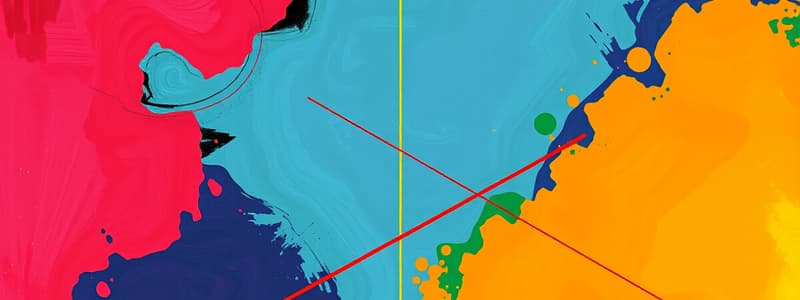Podcast
Questions and Answers
What does the concept of scarcity imply in economics?
What does the concept of scarcity imply in economics?
- Resources are evenly distributed among the population.
- Unlimited resources are available for all wants.
- All goods and services can be produced without limits.
- Limited resources can satisfy unlimited wants. (correct)
Which of the following is an example of a trade-off?
Which of the following is an example of a trade-off?
- Deciding between two car models that cost the same.
- Having enough money to buy both a car and a motorcycle.
- Investing in stock while keeping money in a savings account.
- Choosing to buy either a car or a motorcycle. (correct)
What is opportunity cost?
What is opportunity cost?
- The benefit lost from the next best alternative when a decision is made. (correct)
- The average cost of a good divided by its quantity produced.
- The total cost of multiple options considered.
- The cost incurred from producing one additional unit of a good.
Which of the following statements aligns with the idea that people are rational?
Which of the following statements aligns with the idea that people are rational?
What is the purpose of marginal analysis in decision-making?
What is the purpose of marginal analysis in decision-making?
What role do assumptions play in developing economic models?
What role do assumptions play in developing economic models?
Which of the following best describes an economic variable?
Which of the following best describes an economic variable?
What is the first step economists generally follow when developing a model?
What is the first step economists generally follow when developing a model?
Under what condition does optimal decision-making occur?
Under what condition does optimal decision-making occur?
Which advantage allows a country to produce a good more efficiently than another?
Which advantage allows a country to produce a good more efficiently than another?
What type of analysis is focused on what is and involves value-free statements that can be verified?
What type of analysis is focused on what is and involves value-free statements that can be verified?
Which of the following best defines microeconomics?
Which of the following best defines microeconomics?
Economic growth can be illustrated using which economic concept?
Economic growth can be illustrated using which economic concept?
What is the primary basis for trade between individuals, firms, or countries?
What is the primary basis for trade between individuals, firms, or countries?
Which statement about absolute advantage is true?
Which statement about absolute advantage is true?
What is normative analysis concerned with?
What is normative analysis concerned with?
Which of the following describes the concept of opportunity cost?
Which of the following describes the concept of opportunity cost?
What do production possibility frontiers illustrate?
What do production possibility frontiers illustrate?
When it is stated that specialization can lead to economic gains, what is implied?
When it is stated that specialization can lead to economic gains, what is implied?
Which of the following is an example of macroeconomics?
Which of the following is an example of macroeconomics?
Flashcards are hidden until you start studying
Study Notes
Economic Concepts
- Scarcity: A situation where unlimited wants exceed limited resources.
- Resources: Includes natural resources (land, water, minerals), labor, capital, and entrepreneurial ability used to produce goods and services.
- Trade-off: Producing more of one good necessitates producing less of another due to scarcity.
Economic Models
- Economic Models: Simplified representations of reality for analyzing real-world economic situations.
- Economic Variables: Measurable elements relating to resources, with varying values (e.g., wages, prices, liters of petrol).
- Model Development Steps:
- Decide on assumptions.
- Formulate testable hypotheses.
- Utilize economic data for testing.
- Revise models based on failure to explain data.
- Retain revised models for future inquiries.
Analysis Types
- Positive Analysis: Focuses on objective, verifiable statements about what is.
- Normative Analysis: Involves subjective value judgments about what ought to be, which cannot be tested.
Microeconomics vs. Macroeconomics
- Microeconomics: Examines choices made by households and firms, their market interactions, and government influence.
- Macroeconomics: Studies the economy as a whole, covering inflation, unemployment, and economic growth.
Economic Growth
- Economic Growth: Represents the expansion of society's production potential, often illustrated with the Production Possibility Frontier (PPF).
Comparative Advantage and Trade
- Production Possibility Frontier (PPF): Used to explain economic gains from specialization and trade.
- Trade: Involves the buying and selling of goods/services within a market.
- Absolute Advantage: The ability to produce more of a good using the same resources compared to competitors.
- Comparative Advantage: The ability to produce a good at a lower opportunity cost than other producers.
- Basis for Trade: Driven by comparative advantage, not absolute advantage; specialization and trade enhance welfare.
Studying That Suits You
Use AI to generate personalized quizzes and flashcards to suit your learning preferences.




